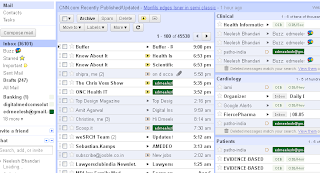Practicing medicine is a very personal experience. Patients don't go to hospitals to buy medicines but to access healthcare services. Healthcare professionals don't deliver a product, but a high quality personalized service.
Current hospital practices have resulted in patients in India classifying any contact with a hospital / Healthcare delivery institute as an anxiety-inducing activity. Hospitals (and doctors) who can overcome this 'communication issue' and engage patients in improving their health are considered better than others.
After Printing Press --> Telephone and Fax --> Internet, digital technologies are now positioned as the most powerful tool for 'Word of Mouth" marketing as well as medical communication campaigns. Social media is an underutilized but very very powerful tool for healthcare professionals. It seems to be another channel of communication ( like Fax and Telephone were once) destined to be rubbished and ridiculed before being accepted by all as a routine practice.
Here are three practical reasons Healthcare professionals need to use social media.
.Here are three practical reasons Healthcare professionals need to use social media.
Why Healthcare Professionals Need To Use Social Media
View more PowerPoint from Neelesh Bhandari
Web 2.0 services like Facebook, Twitter, Blogspot, Linkedin and YouTube are common starting blocks for most hospitals and healthcare service providers. If you are looking for a specialized Healthcare Social Media professional team comprising of doctors, coders and designers to handle your online ecosystem, send us an email at info@digmed.in.







